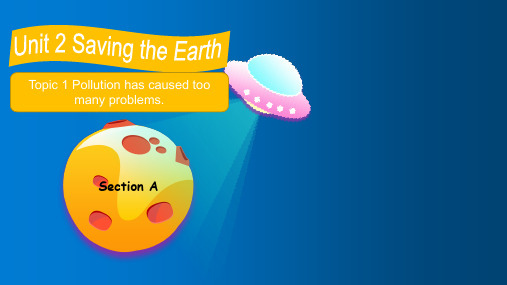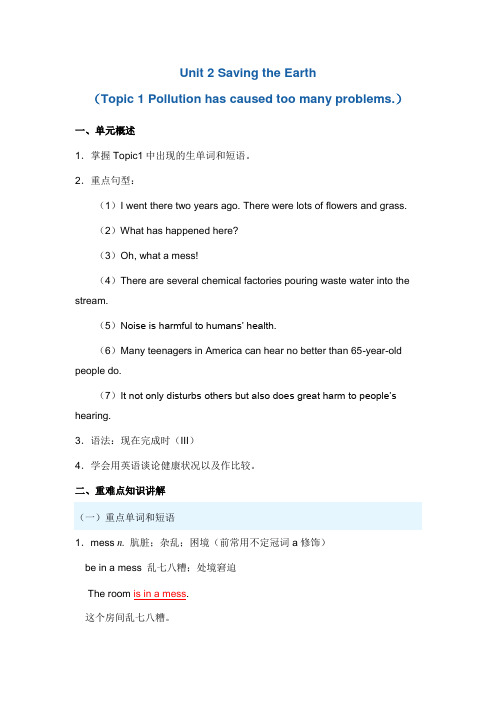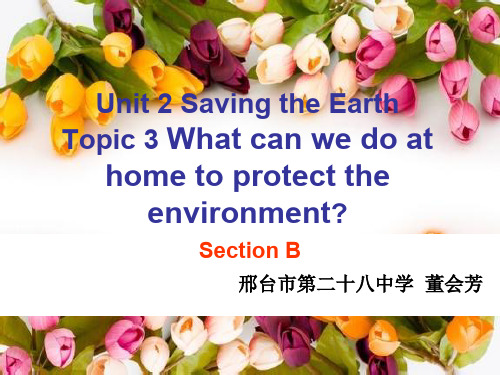精选2019届仁爱版九年级英语上Unit2_Saving_the_Earth词句精讲精练
仁爱版英语九年级上册Unit 2 Saving the earth Topic 1知识点汇编

Unit 2 Saving the earth Topic 1知识点汇编一、重点词汇(一)词形变换1. produce(名词) producer2. breathe (名词) breath3. manage (同义词) try4. soil (近义词) earth5. waste (反义词) save6. harm (形容词) harmful7. die (名词) death (形容词) dead 8. downstairs (反义词) upstairs9.pleasant (反义词) unpleasant 10. change (形容词) changeable(二)重点词组1.stand /improve / protect the environment 忍受/改善/保护环境2.produce terrible gas 产生难闻的气味3.manage to do sth. 设法做某事4.in a good / bad mood 情绪好/差5.feel uncomfortable 感到不舒适6.pour waste into river 把废水倒入河里7.something useful 有用的事物8.be harmful to sb. / sth. 对某人/某物有害9.the look of our cities 城市面貌10.see fish swimming 看到鱼儿游来游去11.at present 目前12.shout at sb. 对某人大喊大叫;斥责某人13.stop making so much noise 停顿发出如此大的噪音14.disturb others 打搅别人15.a kind of p ollution 一种污染16.be sorry for doing sth. 对做了某事感到抱歉17.from now on 从现在起18.in noisy conditions 在吵杂的条件下19.become deaf 变聋了20.quite a few 相当多21.no better than 〔几乎〕与……一样差22.cause high blood pressure 引发高血压23.in strong, changeable light 在强烈、易变的光线下二、重点句型。
仁爱版英语九年级上册Unit2Savingtheearth.doc

layer. So the radiation from the sun passes through the hole and it is bad for our health.
【设计意图】:通过scanning环节,学生查找特定信息,进一步指导了学生寻找课文的冇关细节,完成lb,加深对课文内容的了解。
3.Careful reading( 15mins)
(1)Ask students to read with the recording, and finish lc.
(2)Ask students to find out the new phrases in the text.
Too much harmful radiation from the sun passes through the hole・
(2)进一步学习各种污染对地球造成的危害和造成这些污染的原因。
II.能力冃标:
Students will be able to:
(1)能根据图、文进行单词和文章的预测
(2)能根据不同的阅读目的,运用简单的阅读策略获取信息,学习把握关键词记笔记的能力。
It causes the level of the oceans to rise and the climate of the earth to change・When it rains or when the wind blows, the earth is taken away.
As a result, many rivers and lakes are now dead・
仁爱版九年级英语上册Unit 2 Saving the Earth Topic 2 All thes

1 / 13Unit 2 Saving the Earth 教案Topic 2 All these problems are very seriousSection DⅠ. Material analysis本课是第二单元第二话题的第四课时,是本话题的复习课,主活动是1a 和Project 。
通过Grammar 和Functions 让学生归纳总结本话题的语法知识——不定代词和不定副词的用法,以及一些重要的表达。
通过1a 部分,培养学生寻找段落之间的逻辑关系,再利用逻辑关系完成排序任务。
1b 引导学生在阅读过程中注意“wh-questions”,提高阅读效率。
2是通过小组讨论的方式,探究保护水资源和和节约用水的方法,为3的写作任务作铺垫。
3是教会学生如何写倡议书,培养学生在写作中排篇布局,即先构建写作框架,再加上合理的观点。
Project 是通过让学生换位思考,充当不同的自然资源,描述各自的功能,现状和期望,来唤起大众保护环境的意识。
本课所设置的“写倡议书”和“制作海报”都在培养学生“用英语做事情”的能力。
Ⅱ. Teaching aims 1.Knowledge aims :掌握本课的重点词汇和短语,复习不定代词,不定副词和重点表达法。
了解淡水资源短缺的现状。
2.Skill aims:培养学生通过wh-questions(如:what,why等),理解短文的意思。
能够读懂有关自然资源的文章。
能够利用已有框架,加上自己的观点,提高写作技能。
3.Emotional aims: (optional)关注自然资源的现状,倡导学生保护环境,节约用水。
4.Culture awareness:(optional)通过对水资源现状的了解,认识到自然资源对人类的重要性,加入到保护环境、珍惜资源的队伍中。
Ⅲ. The key points and difficult points1. Key points:Words and phrases: avoid, discover, thirsty, nearly, law, shortage, resource, reuse,take sth. away from…, the shortage of water / water shortage, avoid (doing) sth., make progress in, nearly 3/4 of…2. Difficult points:学会归纳话题中的重点语法和表达法。
仁爱科普版九年级上册Unit 2 Saving the earth. Topic 2 Section

Unit 2 Topic 2 Section D【学习目标】1.复习本话题所学词汇、句型和语法。
2.通过wh-questions(如:what, why等),理解短文意思,读懂有关自然资源的文章。
3.通过对水资源现状的了解,认识到自然资源对人类的重要性,加入保护环境、珍惜资源的队伍中。
【预习导学】一、生词速查1.v.防止,避免2.n.发现,找到→n.发现→v.覆盖3.adj.缺水的;(口)渴的4.adv.几乎,将近5.n.法律,法令;定律二、短语速记1.大量2.解决问题3.一天天地4.被……覆盖5.短缺;缺少6.饮用水7.淡水三、句子速译1.How can we avoid a serious water shortage?______________________________________________________________2.But people's need for water is increasing day by day.______________________________________________________________3.While nearly 3/4 of the earth is covered with water, we are still short of drinking water. ______________________________________________________________4.The sea seems to have the best answer.______________________________________________________________5.Let's try our best to save water and our planet.______________________________________________________________四、想一想预习课本1a,展示几幅贫困地区人们缺乏生活用水的图片,让学生讨论下列问题。
仁爱版九年级英语上册Unit 2 Saving the Earth Topic 1 Pollutio

1 / 12Unit 2 Saving the Earth 教案Topic 1 Pollution has caused too many problems.Section DⅠ. Material analysis本课是第二单元第一话题的第四课时,主活动是1a 和Project 。
通过Grammar 来巩固总结一般过去时和现在完成时的区别,通过 Functions 来复习重要的表达法。
1a 按照“总—分—总”的模式分别介绍了各种污染的成因及危害。
通过完成文章后的表格,训练和提高学生获取信息的能力。
教师还可以利用表格内容,引导学生整合信息复述课文,巩固课文内容。
1b 属于同义转换练习。
Project 部分培养学生动手动脑的能力,让学生运用收集的信息和所学知识,通过墙报的形式来宣传污染带来的危害,让更多的人关注环境污染,树立环保意识,增强人们的忧患意识和社会责任感。
Ⅱ.Teaching aims 1.Knowledge aims :掌握本课的重点词汇和短语。
总结一般过去时和现在完成时的区别;复习本话题的重点表达法。
2.Skill aims:能读懂与环境污染问题有关的文章。
能根据关键词复述课文。
3. Emotional aims: (optional)通过了解各种污染带来的危害,帮助学生树立环保意识,爱护环境,保护地球。
4.Culture awareness: (optional)通过学习,引导学生了解环境污染对人类健康有巨大的危害,不同种类的污染体现在不同的方面。
Ⅲ. The key points and difficult points1. Key points:Words and phrases: coal, create, blood, planet, in many ways, with the development of industry, high blood pressure Grammar: the differences between the simple past and present perfect2. Difficult points:能根据关键词复述课文。
仁爱版九年级英语上册Unit 2 Saving the Earth Topic 3 Section

1 / 14Unit 2 Saving the Earth 教案Topic 3 What can we do at home to protect the environment?Section CⅠ. Material analysis本课是第二单元第三话题的第三课时。
主活动是1a 。
1a 介绍了世界各地的人们如何开发和利用环境友好型和资源节约型的新能源,同时也指出了这些新能源的利用方式所存在的不足之处。
在介绍的过程中,让学生学到更多并列句的连接词。
如:however, not only…but also …等。
1b 通过图片匹配可以帮助学生形象地理解比较陌生的事物。
1c 培养学生归纳处理信息的能力。
2a 和2b 是两个关联性很强的任务。
2a 指出人们可以利用可再生能源来发电,并让学生讨论怎样利用这些可再生能源,然后在2b 环节形成书面报告。
这两个环节,其实是培养学生学会作记录,并根据记录整理成短文的能力。
2b 是个书面活动,可以留作家庭作业。
Ⅱ.Teaching aims 1.Knowledge aims :掌握本课的重点词汇和短语,继续学习并列句。
2.Skill aims:学会更多连接并列句的方法。
学会在讨论中作记录,并整理记录使之成文。
能够对信息进行分类处理。
3.Emotional aims: (optional)激发学生探索利用新能源的热情。
4.Culture awareness: (optional)了解世界各国在开发和利用新能源方面的现状和成就。
Ⅲ. The key points and difficult points1. Key points:Words and phrases: technology, renewable, disadvantage, require, German, wheel, guide, deep, run out, source, worldwide, produce…from…, not only…but also…, too…to…Sentences: However, nuclear power can be very dangerous.It can not only protect the environment but also save energy.It’s too small to h old many people.Grammar: compound sentence2.Difficult points:理解文章中出现的大量专业术语。
仁爱版九年级英语上unit2SectionA saving the earth

_P___ bees _P___ fresh
__P__ clean
_N___waste water
While-reading
1b Read 1a and complete the sentences in the table. Then retell 1a to your partner.
Two years ago
village/flowers and grass villagers/destroy
Example: A: There were lots of flowers and grass
when I visited the village last year. B: But now the flowers and grass have gone. A: What has happened here? B: The villagers have destroyed them.
Post-reading Work in pairs. Look at the pictures and make up 2 conversations similar to the example with your partner.
hill / trees farmers/cut down
A: There were lots of trees when I visited the hill last year.
A. cross B. crossed C. crosses D. to cross
Language points
While-reading
2. The flowers and grass have gone! 花和草都消失了。
仁爱版九年级上Unit2 topic1二单元话题一(英语教案)

Unit 2 Saving the Earth(Topic 1 Pollution has caused too many problems.)一、单元概述1.掌握Topic1中出现的生单词和短语。
2.重点句型:(1)I went there two years ago. There were lots of flowers and grass.(2)What has happened here?(3)Oh, what a mess!(4)There are several chemical factories pouring waste water into the stream.(5)Noise is harmful to humans’ health.(6)Many teenagers in America can hear no better than 65-year-old people do.(7)It not only disturbs others but also does great harm to people’s hearing.3.语法:现在完成时(III)4.学会用英语谈论健康状况以及作比较。
二、重难点知识讲解(一)重点单词和短语1.mess n. 肮脏;杂乱;困境(前常用不定冠词a修饰)be in a mess 乱七八糟;处境窘迫The room is in a mess.这个房间乱七八糟。
make a mess 把……弄得乱七八糟e.g.The children have made a mess in the house.孩子们把屋里弄得乱七八糟。
get into a mess 遇到困境;遇到麻烦e.g.If your company gets into a mess, what will you do? 如果你公司遇到困境,你会怎么做?2.shame n.羞耻,羞愧[U];遗憾[C]e.g.She felt a deep sense of shame.她深感羞耻。
2019-2020学年仁爱版九年级英语上Unit2_Saving_the_Earth词句精讲精练

Unit 2 Saving the Earth词句精讲精练词汇精讲1. pollutepollute为及物动词,意为“污染,弄脏”;pollution为pollute的名词形式,意为“污染”,是不可数名词。
例如:We should not pollute our rivers with waste. 我们不应让废弃物污染我们的河川。
Pollution is a big problem. 污染是个大问题。
【拓展】含pollution的习惯用语:air pollution 空气污染noise pollution 噪音污染2. althoughalthough的意思相当于though,意为“尽管,虽然”,用来引导让步状语从句。
它所引导的从句不能与并列连词but; and; so等连用,但可以和yet; still等词连用。
例如:Although he lives alone, he doesn’t feel lonely.= He lives alone, but he doesn’t feel lonely.虽然他一个人住,但他并不感到孤独。
There is air all around us, although we cannot see it.虽然我们看不见空气,但空气却存在于我们的周围。
【拓展】although与though的辨析:(1) 用作连词,表示“虽然”,二者可以互换使用,但although比though更为正式。
例如:Though/Although it was raining, we still went there. 虽然下着雨,但我们还是去了那里。
(2) although一般不用作副词,而though可用作副词,且一般放在句末(不放在句首),意为“可是,不过”。
例如:It’s hard work; I enjoy it, though. 工作很辛苦,可是我很喜欢。
We all tried our best. We lost the game, though. 我们都尽力最大努力,但我们还是输了。
英语仁爱版九年级上册《Unit 2 Saving the Earth Topic 2 All 》课件公开课

you are not using them.
③Recycle boxes and plastic bottles. ④Grow fruit and vegetables yourself. ⑤Try to ride a bike when you travel. ⑥Use both sides of the paper. ⑦Cover pans when you are cooking.
V.Recite
VI. Other suggestions to be a greener person.
2 Match them with the right pictures and read them.
①Reduce waste. Don’t buy cups or
boxes which can be used only once.
Three stars:(Fill in the blanks )
The earth is our home. Some things we have done are good for the earth w_h_i_le__ some are bad. We have polluted the earth, a__n_d___ it is sick now. We c_u_t___ down too many trees, so lots of rich land has c_h_a_n_g_e_d_ into desert. Factories p_o_u_r_ waste water into rivers. Pollution has caused many se_r_i_o_u_s problems. The earth is crying for help.
仁爱版九年级英语上Unit 2 Saving the earth Topic 1 Pollution

the
water
was
clean
in
(F) 2 You couldn’t see bees and butterflies dancing
in the past.
(T) 3 Now the flowers and grass have gone.
(F) 4 The factories didn’t pour waste water
1. Is the West Hill a beautiful place now?
2. Did they have a picnic there?
Mark the sentences with T(true) or F (false)
(T)
1 The air the past.
was
fresh
and
先进个人。
有 人 说 法 官 不学习 ,等于国 家没有 法律,这 话一点 也不假 。因为 每部新法规的颁布实 施 ,都 要 看 法 官的掌 握程度 。如果 法官
不 掌 握 ,等 于 立法机 关白忙 活。鉴 于学习 的重要 ,我工作
3a
1
2
3
Work alone
4 a. air pollution
b. soil pollution 5
Unit 2
Topic 1
Pollution caused too many problems
Section A
Enshi Qingjiang Foreign Language School Ni Jing
Step 1 Review and Lead-in
Show some picutres to discuss and present a film to lead in
- 1、下载文档前请自行甄别文档内容的完整性,平台不提供额外的编辑、内容补充、找答案等附加服务。
- 2、"仅部分预览"的文档,不可在线预览部分如存在完整性等问题,可反馈申请退款(可完整预览的文档不适用该条件!)。
- 3、如文档侵犯您的权益,请联系客服反馈,我们会尽快为您处理(人工客服工作时间:9:00-18:30)。
Unit 2 Saving the Earth词句精讲精练词汇精讲1. pollutepollute为及物动词,意为“污染,弄脏”;pollution为pollute的名词形式,意为“污染”,是不可数名词。
例如:We should not pollute our rivers with waste. 我们不应让废弃物污染我们的河川。
Pollution is a big problem. 污染是个大问题。
【拓展】含pollution的习惯用语:air pollution 空气污染noise pollution 噪音污染2. althoughalthough的意思相当于though,意为“尽管,虽然”,用来引导让步状语从句。
它所引导的从句不能与并列连词but; and; so等连用,但可以和yet; still等词连用。
例如:Although he lives alone, he doesn’t feel lonely.= He lives alone, but he doesn’t feel lonely.虽然他一个人住,但他并不感到孤独。
There is air all around us, although we cannot see it.虽然我们看不见空气,但空气却存在于我们的周围。
【拓展】although与though的辨析:(1) 用作连词,表示“虽然”,二者可以互换使用,但although比though更为正式。
例如:Though/Although it was raining, we still went there. 虽然下着雨,但我们还是去了那里。
(2) although一般不用作副词,而though可用作副词,且一般放在句末(不放在句首),意为“可是,不过”。
例如:It’s hard work; I enjoy it, though. 工作很辛苦,可是我很喜欢。
We all tried our best. We lost the game, though. 我们都尽力最大努力,但我们还是输了。
(3) 在as though(好像,仿佛),even though(即使,纵然)等固定短语中不能用although。
例如:He talks as though he knew everything. 他夸夸其谈,好像无所不知。
3. none(1) none意为“没有,都不”,表示全部否定,可指人或物,常与of 连用,后接可数名词时,谓语动词用单、复数形式均可,接不可数名词时,谓语动词只能用单数形式。
常回答how many/much的问句。
例如:— How many students are there in the classroom? 教室里有多少学生?— None. 一个也没有。
None of us likes her. 我们当中没有一个人喜欢她。
【拓展】no one; none与nothing的辨析:No one/Nobody told you to go. 没有人告诉你走。
None of them came back. 他们当中没人回来。
I knew nothing about that. 关于那件事我一无所知。
4. hopehope意为“希望”,用于表示有可能实现的愿望,其后可接不定式,即:hope to do sth. 意为“希望(自己)做某事”;若表达“希望别人做某事”时则需用hope + that从句,不能用hope sb. to do sth.的结构。
例如:I hope you can pass the exam. 我希望你能通过考试。
I hope to go to Tibet some day in the future. 我希望将来有一天去西藏。
【拓展】hope与wish的辨析:(1) 相同点:表示“想;希望”,宾语可为to do,不能用doing。
例如:I hope/wish to visit Guilin. 我希望去桂林观光。
(2) 不同点:wish后可以跟复合宾语,即wish sb. to do sth.,而hope则不能。
例如:I wish you to go. (正) 我希望你去。
I hope you to go. (误) 我希望你去。
(3) 两者都可接that从句,但是“hope + that从句”表示希望,“wish + that从句”表示愿望,且从句的谓语动词要用虚拟语气。
例如:I hope you’ll be better soon. 我希望你很快好起来。
I wish I were really wealthy. 但愿我真的富有。
(4) wish后可接双宾语。
例如:We wish you a happy New Year! 我们祝你新年快乐!5. discoverdiscover是动词,意为“发现”,其后可接名词、代词、疑问词+不定式及that从句等。
例如:We never discovered how to open the box. 我们从未弄清楚如何打开这个盒子。
【拓展】(1) discover意为“发现”,指有意或无意地发现已经存在尚不为人知的事物。
例如:China has discovered oil under the South China Sea. 中国在南海发现了石油。
(2) find意为“找到、发现”,指偶然发现或经过一番寻找,找到值得或所需的东西,强调找的结果。
例如:I found the book I was looking for. 我找到了一直在找的书。
(3) find out意为“查明白、弄清楚”,多用于经过调查、分析、研究等手段查出的情况,查出的东西往往是抽象的,如时间、事实、真相等。
例如:Please find out when the meeting starts. 请查一下会议什么时候开始。
(4) invent意为“发明”指经过研究、设计而创造出原本未有的东西。
例如:Cai Lun invented the paper. 蔡伦发明了纸。
6. too muchtoo much意为“许多,大量”,后接不可数名词,也可作代词短语。
例如:I had too much. I’m full now. 我吃的太多了,现在饱了。
【拓展】too much / too many / much too的辨析:Don’t eat too much sweet. It’s bad for your teeth. 不要吃太多的糖,对牙齿不好。
There are too many books in the room. You can choose any one to read.房间里有太多的书了,你可以选择任何一本来读。
It’s much too cold outside. You should put on your coat. 外面太冷了,你应该穿上外套。
7. something usefulsomething useful意为“有用的事情”,形容词useful作后置定语修饰不定代词something。
形容词修饰不定代词,常放在不定代词之后,即形容词作不定代词的后置定语。
例如:There is nothing new in today’s newspaper. 今天的报纸上没有什么新鲜事。
Do you have anything important to tell me? 你有什么重要的事情要告诉我吗?He heard something interesting outside today. 今天他在外边听到了一些有趣的事。
【拓展】(1)不定代词作主语时,相当于第三人称单数。
例如:Something is wrong. 某东西有问题。
(2) 常见的不定代词还有:anything; nothing; somebody; someone; anybody; nobody; no one等。
8. need(1) need作实义动词,意为“需要”。
常用搭配为need sth.或 need to do sth. 例如:I need some help. 我需要一些帮助。
You need to see a doctor. 你需要去看医生。
He needs to take a bus. 他需要去搭车。
(2) need 当作情态动词时,只能用于疑问句,否定句和条件句。
可表示为need do sth.,否定形式为 neednot do sth. 例如:Need I finish my homework now? 我需要现在完成作业吗?He need not go there by car. 他没必要开车去那里。
9. withoutwithout是介词,意为“无,没有”,后接名词、代词或动词的-ing形式。
without构成的介词短语具有否定含义,在句中相当于构成了否定句。
例如:I can’t do it without your help. 没有你的帮助,我不能做这件事。
He went to school this morning without having breakfast. 他今天早上没吃早饭就去上学了。
10. how long(1) how long意为“多长时间”,询问某一动作或状态持续了多久,故句中的谓语动词必须是延续性动词或表示状态的连系动词。
例如:How long do you watch TV? 你看电视多长时间了?How long can I keep the book? 这本书我可以借多久?(2) how long还可用来询问长度。
例如:How long is the river? 这条河多长?【拓展】11. while(1) while 作连词,意为“当……时候”,引导时间状语从句,并且是主句和从句动作同时发生,从句中的动词必须是延续性动词或表状态,且常用进行时态。
例如:He came in while I was watching TV. 当我在看电视时,他进来了。
(2) while作连词,还可意为“而,然而”,强调动作的对比。
例如:I like tea while she likes coffee. 我爱喝茶,而她爱喝咖啡。
(3) while作名词,意为“一会儿,片刻”,常用于after a while中,表示“过了一会儿”。
例如:After a while, she came to herself. 过了一会儿,她苏醒过来了。
【拓展】while; when与as的辨析:(1) while强调动作同时进行,从句常用进行时,其动词必须为延续性动词或表状态。
例如:Could you look after my dog while I’m away? 我离开时,你能照看我的狗吗?(2) when既可指动作同时进行,也可指先后发生,从句中的动作既可是延续性动词,也可是非延续性动词。
